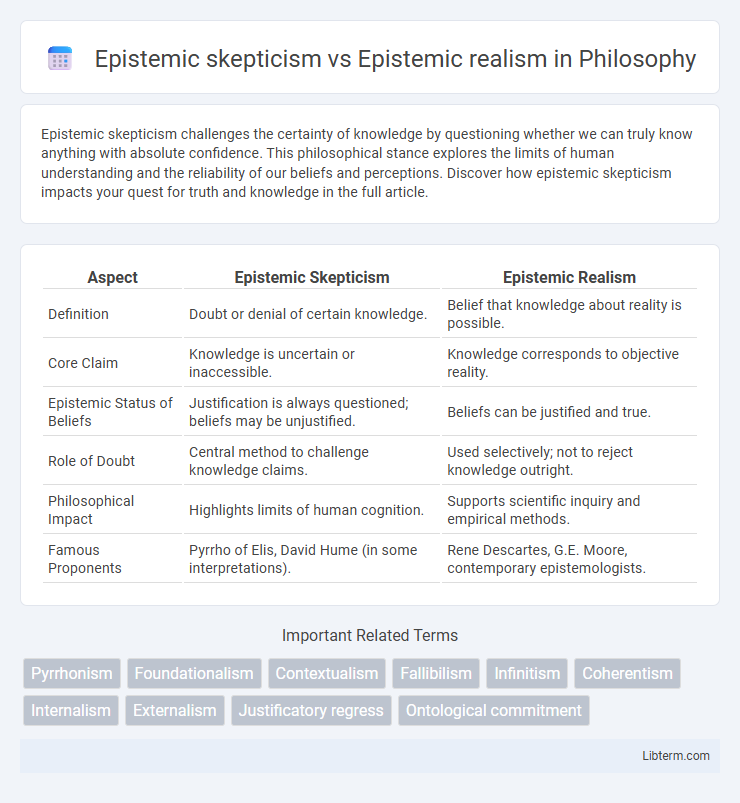Epistemic skepticism challenges the certainty of knowledge by questioning whether we can truly know anything with absolute confidence. This philosophical stance explores the limits of human understanding and the reliability of our beliefs and perceptions. Discover how epistemic skepticism impacts your quest for truth and knowledge in the full article.
Table of Comparison
| Aspect | Epistemic Skepticism | Epistemic Realism |
|---|---|---|
| Definition | Doubt or denial of certain knowledge. | Belief that knowledge about reality is possible. |
| Core Claim | Knowledge is uncertain or inaccessible. | Knowledge corresponds to objective reality. |
| Epistemic Status of Beliefs | Justification is always questioned; beliefs may be unjustified. | Beliefs can be justified and true. |
| Role of Doubt | Central method to challenge knowledge claims. | Used selectively; not to reject knowledge outright. |
| Philosophical Impact | Highlights limits of human cognition. | Supports scientific inquiry and empirical methods. |
| Famous Proponents | Pyrrho of Elis, David Hume (in some interpretations). | Rene Descartes, G.E. Moore, contemporary epistemologists. |
Introduction to Epistemic Skepticism and Epistemic Realism
Epistemic skepticism questions the possibility of certain knowledge, asserting that human knowledge is limited or potentially unattainable, often emphasizing doubt regarding sensory perception and justification. In contrast, epistemic realism maintains that knowledge corresponds to an objective reality independent of individual beliefs, affirming that humans can attain true and justified beliefs about the world. These positions form a fundamental divide in epistemology, addressing the nature, scope, and limits of human understanding and knowledge acquisition.
Historical Background of Epistemology
Epistemic skepticism emerged during the ancient Greek period, notably through Pyrrhonism and Academic skepticism, questioning the possibility of certain knowledge and emphasizing doubt as a critical philosophical method. Epistemic realism, rooted in Aristotelian thought, asserts that knowledge corresponds to an objective reality independent of perception, gaining prominence during the Scientific Revolution with thinkers like Descartes and Locke advocating for the attainability of true knowledge. The historical development of epistemology reflects a dynamic tension between these positions, shaping foundational debates on the nature, scope, and limits of human knowledge.
Defining Epistemic Skepticism
Epistemic skepticism questions the possibility of certain knowledge by asserting that human cognitive faculties are inherently limited or unreliable, challenging the justification of beliefs. It fundamentally contrasts with epistemic realism, which holds that knowledge about an external world is attainable and that beliefs can be objectively true or false. Defining epistemic skepticism involves emphasizing its radical doubt regarding the sufficiency of evidence and reasoning to achieve justified true belief.
Fundamentals of Epistemic Realism
Epistemic realism asserts that knowledge corresponds to an objective reality independent of human beliefs, emphasizing that truths about the world exist and can be discovered through evidence and reason. It fundamentally opposes epistemic skepticism, which doubts the possibility of certain or complete knowledge. Core to epistemic realism is the commitment to the idea that cognitive access to reality is attainable, enabling reliable judgments about truth and falsity.
Key Arguments for Epistemic Skepticism
Epistemic skepticism challenges the possibility of certain knowledge by questioning the reliability of sensory experiences and the limitations of human cognition, emphasizing the potential for error in all beliefs. It argues that justifications for knowledge claims are inherently circular or regressively flawed, casting doubt on the attainability of absolute truth. This philosophical stance contrasts sharply with epistemic realism, which maintains that objective knowledge is attainable and that reality exists independently of human perception.
Core Principles of Epistemic Realism
Epistemic realism maintains that knowledge corresponds to an objective reality independent of human perception, emphasizing the existence of truth that can be discovered through empirical investigation and rational inquiry. This core principle asserts that beliefs are justified when they accurately reflect external facts and that objective truth is attainable despite potential cognitive limitations. Unlike epistemic skepticism, which questions the possibility of certainty, epistemic realism upholds that knowledge claims can be reliably grounded in evidence and reason.
Major Philosophers and Influential Theories
Epistemic skepticism, championed by philosophers such as Pyrrho and Sextus Empiricus, argues that knowledge is either impossible or highly uncertain, emphasizing radical doubt and the suspension of judgment. Epistemic realism, articulated by thinkers like Aristotle and contemporary figures such as Alvin Plantinga, asserts that knowledge corresponds to objective reality and that human cognition can reliably access truths about the world. Key theories include Descartes' methodic doubt underpinning skepticism and Plantinga's warrant theory supporting realism's claim of justified true belief.
Critical Differences between Skepticism and Realism
Epistemic skepticism questions the possibility of certain knowledge, emphasizing doubt about the reliability of our cognitive faculties and sensory experiences. Epistemic realism asserts that knowledge about the external world is achievable and that objects exist independently of our perceptions, supporting the idea of objective truth. The critical difference lies in skepticism's challenge to the certainty of knowledge versus realism's confidence in the existence and knowability of an external reality.
Contemporary Debates in Epistemic Theory
Contemporary debates in epistemic theory center on the tension between epistemic skepticism, which doubts the possibility of certain or absolute knowledge, and epistemic realism, which asserts that knowledge corresponds to mind-independent reality. Skeptics challenge the justification of knowledge claims by emphasizing the problem of epistemic access and the limits of evidence, while realists defend the existence of objective truths and reliable cognitive faculties for accessing them. Recent discussions explore contextualism and invariantism as responses to skepticism, aiming to reconcile or clarify the nature of knowledge in light of these competing perspectives.
Implications for Knowledge and Truth
Epistemic skepticism challenges the possibility of attaining certain knowledge, asserting that beliefs may never be justified beyond doubt, which undermines absolute claims about truth. Epistemic realism, by contrast, holds that knowledge is attainable and that truth corresponds to an objective reality independent of human perception. The implications for knowledge involve skepticism limiting certainty and demanding rigorous justification, while realism supports the pursuit of objective truths through empirical evidence and rational inquiry.
Epistemic skepticism Infographic

 libterm.com
libterm.com